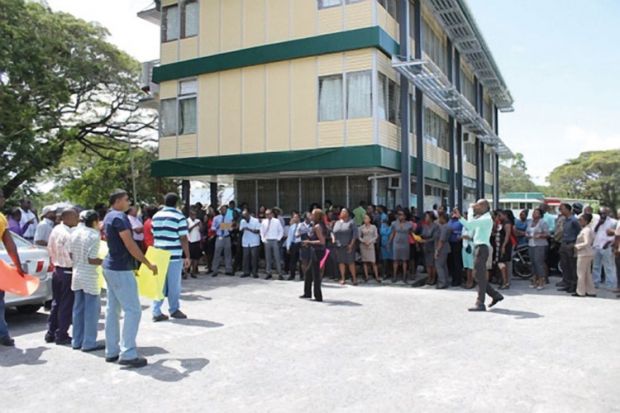Guyana
Sit-in seeks a better bottom line
Staff at the University of Guyana staged a sit-in to protest against their pay and conditions. Most academic and support staff arrived at work on 26 January but did not carry out their duties. The protesters are reportedly seeking a 60 per cent rise in wages and have said that the sit-in could go on for weeks if their demands are not met. A deal proposed by the vice-chancellor on 28 January was rejected by unions, which claim that working conditions are often dangerous and that staff are underpaid.
Burma
March wins talks with government
The government of Burma has agreed to meet students to hear their concerns about an education bill. The move follows a rare protest march, according to the BBC website. Last week, students began to march from Mandalay to Yangon to highlight fears that the national education bill will constrain academic freedom at universities, which had been hotbeds of dissent against the former military regime. Aung San Suu Kyi, chair of the opposition National League for Democracy, had backed calls for government negotiations with students.
China
Stop the Western rot, academics told
An influential Chinese Communist Party journal has attacked academics who promote “Western values”, in line with a recent party edict that universities should champion Marxism and traditional culture. An article in Qiushi by party official Xu Lan singled out He Weifang, a professor of law at Peking University. “It will be a disaster if we fail to set up standards and a bottom line to prevent high school and university teachers spreading Western values through internet platforms to defame our communist ideology,” Mr Xu wrote. Pressure on universities has risen since December when Xi Jinping, China’s president, said they should be subjected to greater “ideological guidance”.
Turkey
Raw treatment
Two Turkish students who shot a pornographic film for their coursework have been acquitted of criminal charges. Deniz Özgün, 26, and Elif Şafak Urucu, 25, say that they have endured a “four-year nightmare”. Their project to highlight synthetic depictions of sex had been approved by academics at Istanbul Bilgi University, but the dissertation was marked as a fail on submission and the pair were arrested a few days later. Mr Özgün and Ms Urucu had go into hiding after hate mail flooded into the university, which proceeded to sack three academics and to shut its film department.
South Africa
Africa needs home-grown Moocs, scholar says
African universities should produce more massive open online courses to counter the “dominance” of Western institutions, a scholar has said. That the vast majority of Moocs are produced in the northern hemisphere renders local knowledge and locally relevant courses “invisible” to many students globally, said Laura Czerniewicz, director of the Centre for Innovation in Learning and Teaching at the University of Cape Town. She spoke as Cape Town launched its first Mooc, on the UK-based platform FutureLearn, “Medicine and the arts: humanising healthcare”.
Australia
Pass the bill to keep us competitive, universities plead
Universities have again urged senators to pass Australia’s controversial higher education bill amid indications that the government is prepared to compromise further. The bill, which would uncap tuition fees, was rejected by the Senate before Christmas but has been reintroduced. According to The Australian newspaper, the government is willing to reduce its proposed 20 per cent cut to teaching funding to ease the upward pressure on fees. Belinda Robinson, chief executive of Universities Australia, urged senators to pass a bill that “will position Australia’s universities to compete with the world’s best”.

